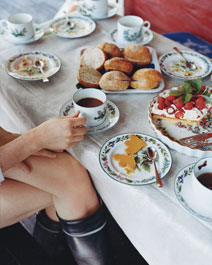Juha is the shaman. He knows everything. I remember once, when I was about five, my parents woke us up in the middle of the night, scooped us into the car, and drove out to the fields, on Juha’s instructions. Standing mop-headed and bleary-eyed in our nightgowns, we saw why: Under a blue dusk, a female moose was grazing in the wheat fields with three of her young. We still look up to Juha like kids. At coffee, my sister and I ask him, “Should we go fishing tonight?” He glances up at the sky, then returns his gaze to his coffee cup. “Tonight is a good night,” he says. He’s never wrong.
We set nets in the bay or in the water around Karinokka. The nets might clip a whole school of perch or bream, or snag a lonely flounder; early in the summer we get wild salmon coming inland to the rivers. We clean and scale the fish, and if we want to get fancy, we hand them to my grandfather. Using the knife that hangs from his belt all summer long, he zips along the fish’s ribs, and within seconds tosses a perfect, opalescent fillet into my grandmother’s hands.
A few times every summer, we scrub the berry stains off our arms and make what feels like a momentous trip into the port city of Turku, about half an hour’s drive from Steninge. My grandmother still presses birthday money into my hand as we head out the door, and I still spend it on candy in the dimly lit turn-of-the-century market hall. Turku is the oldest city in Finland—the Swedes established it as the country’s religious and civic center in the 13th century. (Helsinki only became the capital in 1812, under Russian rule.) Turku’s medieval castle and cathedral still stand, more steadily than the modern-day university students, who teeter, beer in hand, on the bar-boats that line the Aura River.

At the daily outdoor market in the heart of town, piles of fresh berries are displayed next to the produce from surrounding farms, notably the tiny new potatoes that are part of almost every summer dinner. Other vendors offer sugarcoated rolls, dark bread, sausages, and the fish that come from the 20,000-island archipelago that stretches from Turku toward the Åland Islands. The fish vendors have had the entrepreneurial genius to arrange thin slices of their fresh catch, lightly salted and sprinkled with dill, on small paper plates. My mother and I usually start a trip to the market there, standing on the cobblestones and gulping down slivers of raw white fish.
In the past ten years, a new dining scene has emerged along the river, with restaurants emphasizing regional ingredients. Some offer a “Turku Menu” featuring local specialties such as meat from the archipelago’s sheep. Since Finland joined the European Union, in 1995, the country’s restaurants have shown a heightened enthusiasm for foreign foods. So on otherwise traditional menus, prosciutto and Manchego cheese will pop up un-expectedly among the herring and the reindeer.
When we need something we can’t yank out of my grandparents’ garden—fishing line, say, or a chocolate bar—we drive to the Karuna kyläkauppa, a village store just down the road from the farm. Kylä means “village,” but when I was younger, I confused kylä with kyllä, which means “Yes, of course!” I thought this wooden shack called itself the Yes, Of Course Store. This made sense to me because it had everything.
“Mustard and beer?”
“Yes, of course!”
“Tar soap and paper?”
“In the back.”
“Spare oar?”
“Behind the wigs.”
We make up excuses to go to the store for the sheer adventure of it. Karuna resembles other small farming towns on the coast and throughout the archipelago. It has a gas station for boats and cars, a pub heavily patronized by a 20-year-old German shepherd, and a post office where the postlady gives haircuts (unless it’s a beauty parlor that mails packages).
I don’t know exactly why my great-grandfather settled in this little town after 17 years on the other side of the world, but I do know that Steninge pulls us back across the ocean, too, every year. And I’m not sure why a watchmaker with no agricultural experience would decide to run a farm. But Steninge did make a farmer of my great-grandfather, and its transformative powers are still intact.
“Did you see?” I remark at coffee time. “The muskrat found a mate.”
“Good,” comes the reponse. “He needed company.”


 Pinterest
Pinterest






